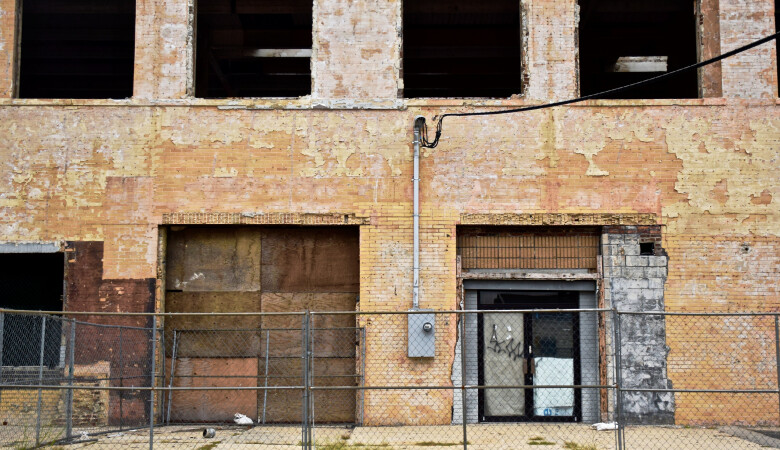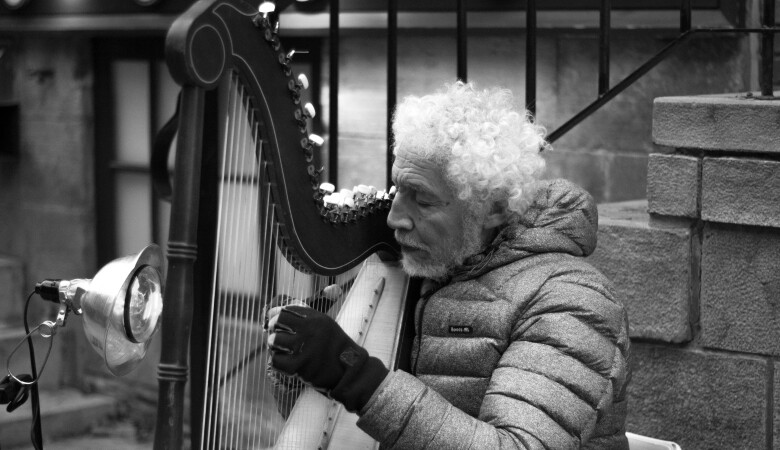Satan's Lies about the Resurrection Fail to Stop the Gospel (Matthew Sermon 150 of 151)
September 29, 2013 | Andy Davis
Matthew 28:11-15
Faith, Joy, Resurrection of Christ, Satan
sermon transcript
The History of the Resurrection Essential to Our Faith
Counterfactual History
Amen. Amen. When John Calvin, the 16th century reformer, was making a defense for why yet another commentary in Romans was needed, he talked about the ones that were out there and he wanted to write, he always had a desire to write, a commentary that was characterized by lucid brevity. Lucid brevity. That means being really, really clear and being short. Well, I'm hoping you're gonna get clarity, I don't know about brevity today, dear friends. I have no idea. We'll see. But this text brings, at least has brought me into the consideration of the issue of apologetics and the defense of our faith against the lies that Satan spreads concerning the resurrection, and this is a huge topic.
And so my desire as I've labored all week and gotten into conversations with staff guys and called them on the phone and bugged them, and we've just been talking and talking about the role of apologetics, what it is, how we can defend our faith. My thinking is still in process and probably will be even after I'm done preaching the sermon, but I'm hoping for at least some clarity because I've been told by those that are experts on preaching that a mist in the pulpit is a fog in the pew. So my desire is to be as clear as I can so I can help you as well.
And now I begin by asking this question: What if...? What if…? It's actually the name of a book, an edited collection of essays by prominent historians on counterfactual history. The idea is that you choose some moment in history in which some significant thing happened, and they asked, “What if that thing hadn't happened? What if it had gone a different direction?” For example, in the first battle that Alexander the Great ever fought against the Persians, he was struck from his horse and was on the ground, and a big, huge Persian was about to put an ax through his head, and one of Alexander's body guards killed this guy right before the stroke fell. What if he had died at that point? How would history be different? Now, those of you that are in Seminary studying Greek, you may have wished that Alexander had been killed at that moment 'cause you wouldn't be studying Greek right now, but it was the Lord's will for him to live.
What if? What if George Washington's army, his continental army, had been trapped in New York City in the summer of 1776, as it almost was? It was very, very close, and only a fog allowed him to escape. What if Hitler had never invaded the Soviet Union and just been content to protect what he had already conquered by that point in 1941? Various questions of counterfactual history, very popular with history buffs. It makes it interesting to kind of wonder, historical speculations. History is a tapestry, different fabrics weaving together to make an incredible picture, and what if that moment had gone a whole different direction, what different colors would have been woven?
Paul’s Assertion
But the most important counterfactual ever asked is actually asked in Scripture, in 1 Corinthians 15. What if Jesus Christ had never been raised from the dead? What if? What if the resurrection didn't happen? Paul makes some very strong assertions about this issue in 1 Corinthians 15, “If there is no resurrection of the dead, then not even Christ has been raised. And if Christ has not been raised,” listen to this, “our preaching is useless, and so is your faith. More than that, we are found to be false witnesses about God, for we have testified about God that he raised Christ from the dead. But he did not raise him if in fact the dead are not raised. For if the dead are not raised, then Christ has not been raised either. And if Christ has not been raised, your faith is futile; and you are still in your sins.”
The Historicity of the Resurrection is Central to the Christian Religion
We believe that the resurrection is essential to all of human history, it's essential to our faith, to Christianity. There would be, should be, no Christianity without a bodily resurrection of Jesus Christ from the dead. We proclaim a God who rules over all of history, and we believe that before the foundation of the world, God had woven out in his own mind the complexities of redemptive history before he said, “Let there be light,” all of it worked out in his own mind, with the resurrection of Jesus Christ as the culmination of that redemptive history, the high point of all that God was doing.
So therefore, all evangelists and all missionaries begin their work as they go to a lost people, and they preach a biography, really a history of Jesus, of his birth and of his life and his miracles, his teachings, of his substitutionary death on the cross, and his bodily resurrection from the dead. Their hearers will be saved if they believe these things are true. Saving faith always moves in two stages. First, stage one: belief that, and second stage: belief in. So we move from belief that, that the facts are this way, this is how it is, it's an actual historical record, that it's true, into a personal saving faith in Jesus Christ, who's at the center of this story. And faith in the resurrection is essential to salvation. Without that, you cannot be saved. Romans 10:9 says, “If you confess with your mouth Jesus is Lord and believe in your heart that God raised him from the dead, you will be saved.” So you must believe in the resurrection of Jesus Christ to be saved from your sins.
Alternate Explanations
Now, because of the importance of this, Satan has been active from the very first day, from that day, active in sowing seeds of doubt and lying about the resurrection. And that's what we see in the text that you heard Nathan read for us just a few moments ago. From the very beginning, Satan has been spreading lies and alternate explanations so that people will not have certainty about the resurrection and then they will not be saved.
Skeptics have mocked the preaching of the resurrection from the early stages of the spread of the gospel. Just read, for example, in Acts 17, when the apostle Paul was in Athens, the intellectual center of the world, some of the most brilliant people who ever lived lived around that time and there are philosophers and thinkers there in Athens, and Paul presented the gospel to them on Mars Hill, and he culminated with a clear proclamation of the resurrection of Jesus from the dead. And it says in Acts 17:32, “When they heard about the resurrection of the dead, some of them sneered.” That's just mockery. That's pure mockery. They sneered. “But others said, ‘We want to hear you again on this subject.’” So there were some people that were intrigued and interested, but others just mocking.
Since that time, many intellectuals throughout history have sought to come up with plausible theories for the resurrection and for the elements of our faith other than a bodily resurrection. And it's really almost humorous if it weren't so deadly serious, it's humorous to try to find out what some of these theories have been. In no particular order, because they're all junk, but I'll go ahead and share with you some of them.
For example, this one: the fake death theory. I hadn't heard this one until just a few days ago. The theory goes: This was a German skeptic, Carl Fredrik Bahrdt, in 1780 he lived. According to this theory, Jesus was fed certain drugs by the physician Luke and went unconscious on the cross. The soldiers were convinced he died, and they took him off of the cross, and he was later revived by Joseph of Arimathea who got him out, and he resumed his life in ministry.
That's closely related to 20 years later, by Karl Venturini, the swoon theory that some of you have heard before. I have a hard time believing anyone ever thought this could even be possible, but many did, they're looking for something. Again, similar to this, that Jesus became unconscious, but not dead on the cross, and the soldiers just thought he was dead. I don't know how much of the biblical story we'll take here, but he had a lance shoved up into his side and all that, survived that. Was put in the tomb, was wrapped up with all the sticky linens, and inside the tomb, the cool air and the spices revived him, he came to, swung his legs around, took off the wrapping, pushed the boulder out of the way, walked through the guards and then convinced his disciples that he was alive and had been raised from the dead and Christianity started that way. What do you think of that theory? Again, I have a hard time believing that intelligent people would ever think this, but this was actually presented as a possibility.
Or that the authorities maybe moved the body, like Pilate did or the Sanhedrin moved the body. The problem with that is, why in the world would they do that? What motive would they have for doing that? And once the preaching of the resurrection started, why wouldn't they just produce the corpse? Or that the tomb was never visited or they went to the wrong tomb. The women went to the wrong tomb, or they just didn't know where it was.
The most common now, as I've been trolling around in atheistic websites, and I'll be glad to stop doing that now that this sermon time has come, but just reading what they're saying out there. The most common now is just general skepticism about almost whether Jesus ever lived. And if he did, I guess we'll take some of the story and he was crucified and thrown in some common burial ground, which is what the Romans would have done, and so any argument from the empty tomb makes no sense. There wasn't an empty tomb, they wouldn't have really even been able to find the body. And then stories about the resurrection came up as legends or myths do much later, decades later, etcetera, and none of it ever happened.
Or perhaps the post-resurrection appearances were mass hallucinations caused by people intensely desiring something and then somewhat producing them. Or, I like this one, the case of mistaken identity. They thought it was Jesus, but it really wasn't. Because of this some liberal theologians claiming to be in the Christian camp have tried to so-called “demythologize” Christianity, tried to strip it of its myths, the gospel accounts, Matthew, Mark, Luke, and John. And frankly, in the end, everything is gonna come down to those.
Friends, we don't know anything about Jesus apart from the written word of God. Every true statement, everything we really do know about Jesus has come to us by Scripture. God intended it that way, and I'm gonna end up kind of ending up there. But they try to strip it of myth. In 1950, psychologist Carl Jung linked Christianity with the Egyptian myth of Osiris, the dying and rising God myth, you're gonna hear a lot of that. And so they attempt to strip down the myths, get away from it and find the historical Jesus.
The problem with that is that it just doesn't line up with how the gospels Matthew, Mark, Luke, and John present themselves to us. They don't read like myth. Do you remember during Jesus' life, at one point, they thought Jesus was insane, he was possessed by a demon? Do you remember how some of the people at that time said, “You know, these are not the sayings of a demon-possessed man. He's not acting like, he doesn't sound like, someone who's insane.” And Matthew, Mark, Luke and John don't read like myth, friends. There are supernatural elements, but what ends up happening is that the skeptics are just exposing their own predisposition.
It's interesting how they say, “Matthew, Mark, Luke, and John all wanted you to believe, so therefore their accounts are not valid.” But they want us not to believe; why should their writings be valid? Do you see what I'm saying? They're coming to it not believing, and in the end, they expose their own hearts. They cannot believe in any supernatural things in these histories, and so therefore there can't be any explanation for it other than these that I've given. And it neglects the way that Matthew, Mark, Luke and John present themselves to us, as carefully written out history. Like Luke 1:1-4, it says, “Many have undertaken to draw up an account of the things that have been fulfilled among us, just as they were handed down to us by those who were from the first eye witnesses and servants of the word. Therefore, since I myself have carefully investigated everything from the beginning, it seemed good also to me to write an orderly account for you, most excellent Theophilus,” listen to this, “so that you may know the certainty of the things you have been taught.”
Primarily, my ministry to you who are believers here today could be summed up in those words. I want you to know the certainty of the things you've been taught. I want you to have an absolute certainty of the resurrection of Jesus Christ from the dead. I want you to take that with you to the hospital, if you go to the hospital this week. Or to a Christian funeral. I want you to take that certainty with you. As you minister in this hurting, sin-cursed, suffering world, I want you to know the absolute certainty of the things you have been taught. And so Matthew, Mark, Luke, and John do not read like myth. They do record supernatural things, but they don't read like myth. And frankly, if you can accept Genesis 1:1, you can accept miracles, can't you? If you can believe that an intelligent being, God, created heaven and earth, then I don't think a resurrection is too difficult to imagine. So if God can create all things, he can make someone walk on water and he can certainly raise the dead.
Skeptics Who Have Been Converted
Other skeptics have investigated carefully Matthew, Mark, Luke, and John, Acts, other things, early documents, 1 Corinthians 15. They've looked at it trying to debunk Christianity and they've been caught by it. Jesus said, “I'll make you fishers of men,” and they end up getting caught and becoming one of Jesus' fish. I love it when that happens, like Frank Morrison who wrote Who Moved the Stone? It's just a pen name for Albert Henry Ross, and he was trying to debunk it and trying to get to the historical Jesus, he ends up converted and becoming a genuine believer in the resurrection. Malcolm Muggeridge was the same. Josh McDowell did the same thing. He eventually wrote Evidence That Demands a Verdict trying to debunk it.
Lee Strobel, who wrote this book that I carried up here with me, The Case for Easter. He was a reporter, hardboiled, skeptical, of a Jewish background. His wife converted to Christianity, he wanted to investigate it so he could show her the truth of it. He ends up getting drawn in and believing in Christ. And The Case for Easter, and there's a bunch of them out there that Kyle Mercer put out there, they're free, take them. So take them and read them or give them out to people, there shouldn't be any left. As a matter of fact, if it's like 12:45, 12:50 and you're there and there's like 15 of them left, take all 15. Give them out to people. We mean to give these things out. But Lee Strobel was just drawn in by the evidence, the evidence.
Satan’s Strategies: Lies, Money, and Murder
Now, in our account today, we have the account of the bribing of the guards, Satan's strategies, lies and money and murder. That's what Satan is going to try to do. He's gonna entice people and try to bribe them away from the truth, try to get them to lie. If they don't go his way, then he'll start to beat them up, incarcerate them, take their freedoms away, eventually kill them. That's what he's tried to do to stop the spread of this story of the resurrection. These are Satan's strategies. And so plausible theories, explaining away the resurrection, this is just the first of many, many attempts there have been. “The disciples came during the night while we were sleeping and stole them away.”
Part of the Gospel Ministry: Apologetics… Reasonable Answers to Satan’s Lies
And so this brings us to the topic of, how do we answer that? How do we understand apologetics? That's just from the Greek word “to make a defense for.” How do we make a defense for our faith and what role does it play? And I've asked a lot this week, what are the limitations of it? There are certain limitations to apologetics, so I've been just wrestling with that.
First, I wanna tell you as a Christian, from one Christian to another, God commands us to do this kind of work. He commands us to do apologetic work. 1 Peter 3:15, he says there, “But in your hearts set apart” or sanctify “Christ as Lord. Always be prepared to give an answer to anyone who asks you, give a reason for the hope that you have.” Now, I don't think there's anything wrong in the context of today's sermon to take the word hope and just link it to resurrection. I have hope in a resurrection. I know that this world is not all that we're gonna experience. I will live forever. And even though worms devour this body, yet in my flesh, I will see God. And I believe in that. That's my hope. If someone wants to say, “Well, give me a reason for that,” you should be ready for that. It is a reasonable thing that I have this hope, it's reasonable, it's not insane, it's not irrational, it's reasonable for me to believe in the resurrection, and I wanna give you a reason, so part of it is to help you folks be ready to give a reason for the hope that you have.
In 2 Corinthians 10, it says the weapons we fight with are powerful to the demolishing of strongholds and we demolish arguments, we are in the word business. Unlike other world faiths, Christianity hasn't advanced on the edge of the sword, true Christianity hasn't. We advance by the truth, by proclaiming the truth, and by being willing to die for it. That's the way that martyrs advanced and conquered, really, the Roman Empire. How powerful is that? And so we have arguments and we're destroying arguments, and we're making a case, we are making a case. It says in Philippians 1:7, Paul's in chains, he says, “For the defense and confirmation of the gospel.” He's defending the Gospel there. Jude 3, the author Jude writes, “I felt I had to write and urge you to contend for the faith that was once for all entrusted to the saints.”
One of the central ministries of an elder or a pastor is a defense of the faith, and we do it according to Jude 22, to be merciful to those who doubt. We wanna lift up those who are flagging and failing and struggling in their faith. I'm trying to do that for you today. If you're a Christian and you struggle with the idea of the resurrection, I wanna bolster your faith. So therefore, one of the requirements in Titus 1:9 for an elder candidate, for somebody who's gonna be an elder, is this: “He must hold firmly to the trustworthy message as it has been taught, so that he can encourage others by sound doctrine and refute those who oppose it.” So that's just part of being an elder, you need to be able to give a refutation just to give a defense.
So there is a purpose, ours is a historical and reasonable faith. It's historical, it's rooted on actual events in history. It's not a myth, it's not a legend. It's historical and reasonable. So I was working on this sermon last night, I usually don't work on sermons on Saturday nights, but I was just - I said to my wife, “It's like I'm baking a cake, and all the ingredients are out and the cake isn't baked yet.” And so I was working on it last night. And this was in my mind, I woke up this morning, my alarm went off, and the first words in my mind were straight from scripture. I didn't know the reference, I looked it up. It was from Acts 26:25, and there the apostle Paul on trial before Agrippa and before the Roman Festus, says these words in Acts 26:25. Festus, after he proclaimed the resurrection. Festus said, “You're out of your mind, Paul, your great learning is driving you insane.” He said, “I'm not out of my mind, what I am saying is true and reasonable.” Those were the first words in my mind this morning. So I figured the Holy Spirit was saying, put that in the sermon. So here it is. I wrote it out along the side, it wasn't in the printed thing, but... “What I am saying is true.” What does that mean? It actually happened, it's historically accurate, really happened, and it is reasonable, it's not insane to believe in these things. And then he says, “These things were not done in a corner.” These things were done in a very famous place in front of lots of people, lots of eye witnesses to this,
And then he appeals directly to the Jewish King Agrippa. He says, “Do you believe in the prophets? I know that you do.” And so what's he doing there? He's saying look at the scriptures, ultimately that's what's gonna cinch the deal. Only by believing in the Word of God will you come to a genuine faith in the resurrection. So that brings me to the limitations of apologetics. Our text, which talks about what John MacArthur called “the lie that proves the resurrection.” We'll get to that in a minute. But it's also a lie that proves the limits to apologetics, there's a limit to it. It will only bring you so far. What do I mean? Well, none of us here that are alive today will ever have the kind of access to the physical evidence of the resurrection that the Sanhedrin and the Roman guards did, and they didn't believe. But concocted a lie.
So how do you put all this together? I remember I was just reading a lot of Evidence That Demands a Verdict and all that. I was a relatively new Christian, graduated from college, I was trying to be a workplace witness, trying to evangelize, and there was this guy there named Larry, and so I was like, I gotta share with Larry, I'm gonna get Larry, I'm gonna... I'm gonna bring him in. Apologetics, we're gonna do it. And so we sat down and I wanted to talk to him about evidence for the resurrection. He probably thought we're gonna talk about the Red Sox, but we talked about evidence for the resurrection, the empty tomb. And so I was gonna zero in on this one thing. What explanation could there be for the empty tomb?
And so I went step by step by step by step. I feel sorry for the guy now, I don't know what happened, he was probably just eating a sandwich saying, “What is this?” It was an interesting moment, but we got done and I said, “What do you think happened to the body?” And he shrugged and said, “I don't know, I guess Jesus rose from the dead.” Is that it? End of the line, Jesus rose from the dead. But there was no faith, no love, no regeneration, nothing. You can't checkmate people into the kingdom of heaven, friends. I liken it to basically Elijah on Mount Carmel, and you can build the altar and you can get the wood and you can put the animal and you can pour water on it, but then you need to wait for fire from heaven. And so what this does is it assembles everything needed for faith, and then the fire has to come from heaven and that person will be saved, because faith is a gift from God, it says in Ephesians 2:8, but it's based on that which is historical and rational, and it's our job to get that history out and that reason out, and that's what we're doing.
Physical Evidence of the Resurrection
Three Key Facts About Saving Faith
So we have physical evidence for the resurrection, we talked about it, and I'm harkening back at this point to the first part of the chapter. If you look at Matthew 28, we have the account, which I preached on last week from, of the empty tomb. You have the empty tomb, you have the angel coming down, we'll get to all of that in a minute, but then you have the statement by the angel to the women: “Come and see the place where he lay.” You see that he's inviting them to investigate the evidence. So in effect, that's what I'm doing. Now, I'm saying this to believers. Notice he doesn't say it to the Roman soldiers, first of all, they were unconscious, I think at that moment, they shook with fear and became like dead men. It says in verse 4, but he didn't come for them. He's saying to the believers: “Come and look at the evidence.” It's for you. The evidence is for you. The unbelievers are just gonna explain it away. But the evidence is for you, so come and see the place where he lay.
Physical Evidence of the Resurrection
Well, it's better described for us in John's gospel, in John 20, you have the stone moved away from the entrance entirely lifted up and moved away. You have the grave clothes there, undisturbed in their original position. I don't know if that's like a chrysalis or something like that, or if he was unwrapped. Commentators go different directions on that, we don't know. Greek just says, “keimai,” just “set there.” And then you've got the head covering folded up separate by itself, it does not speak of a grave robber, does not speak of haste at all. It just speaks of a logical, rational process where somebody folded it up and set it aside. And best of all, of course, no body, there's no corpse. There was one before and now it's gone. So it leaves that question of the empty tomb, where is the missing body, what happened to Jesus?
Personal Evidence of the Resurrection: Eyewitness Testimonies
Then, even better, in the account last week as you remember we have personal encounters with the resurrected Christ. Post-resurrection appearances, and there are many of them. Eleven separate accounts in the four gospels, probably also including Acts as well, of post-resurrection encounters with Jesus, one after the other, I'm not gonna list them for you, but they're one after the other.
Paul lists who receives such post-resurrection encounters. In 1 Corinthians 15, “What I received, he said, I also passed on to you as of first importance that Christ died for our sins according to the Scriptures, that he was buried, that he was raised on the third day according to the scriptures,” and now come the appearances, “and that he appeared to Peter, and then to the twelve, and after that he appeared to more than 500 of the brothers at the same time, most of whom are still living, though some have fallen asleep. Then he appeared to James, then to all of the apostles, and last of all, he appeared to me also as to one abnormally born.”
Lots and lots of post-resurrection appearances, 500 of them, God spread them out throughout Palestine, and they became the original witnesses to the Jews in that region of the resurrection of Jesus Christ. And Christianity was built on their testimony, and the eyewitness testimony it sprang up out of those witnesses, out of those eye witnesses, read about it in Hebrews chapter two, it talks about eyewitnesses of the word, and they talked about that. Paul mentions it in Acts 13, these were now, these eyewitnesses, were now giving the witness to our people, the Jews. So this is overwhelming, the eyewitness accounts.
The Lie that Proves the Resurrection
Now we come to the text, the lie that proves the Resurrection as John MacArthur calls it, I like that statement. Look what it says, “While the women were on their way,” they have this encounter with Jesus and they're on their way, “some of the guards went into the city and reported to the chief priests everything that had happened, when the chief priests had met with the elders and devised a plan, they gave the soldiers a large sum of money, telling them, ‘You are to say “His disciples came during the night and stole him away while we were asleep.” If this report gets to the governor, we will satisfy him and keep you out of trouble.’ So the soldiers took the money and did as they were instructed. And this story has been widely circulated among the Jews to this very day.”
The Enemies of Jesus Sealed Their Fate by Posting the Guard
So there we have the account. First of all, isn't it marvelous how the enemies of the resurrection sealed their fate by posting the guard? It would have been better for them if they had not done it. Do you understand why? Because it's just a lot easier to say, the disciples stole him with the guard not there. The guards make it difficult for them. And so I think that's beautiful. Remember in chapter 27 verses62 and following, this is what it says, “The next day, the one after preparation day, the chief priests and the Pharisees went to Pilate. ‘Sir,’ they said, ‘We remember that while he was still alive, that deceiver said, “On the third day, I will rise again.” So give the order for the tomb to be made secure until the third day.’ Otherwise, his disciples may come and steal the body and tell the people that he has been raised from the dead. This last deception will be worse than the first.’ So Pilate answered, ‘Take a guard, go make the tomb as secure as you know how.’ So they went and made the tomb secure by putting a seal on the stone and posting the guard.”
Now, the whole thing is blowing up in their face. They just ended up being hostile witnesses indirectly to the actual resurrection. It's not what they wanted. And isn't it beautiful, how God turns Satan's weapons against himself. The clearest example of that, is the crucifixion of Christ itself, he meant to kill Jesus because it was Satan that entered into Judas, and in killing Jesus, he destroys his own dark kingdom, and it's been a 2,000-year destruction. Slow-mo destruction, I love that. Step by step, Satan's kingdom being destroyed by the preaching of the gospel, isn't that marvelous? But he did it to himself by crucifying Jesus. And now by the posting of the guard, they actually ended up being hostile witnesses to the fact.
The Guards Could Not Stop the Resurrection
Now, first of all, the guards couldn't stop the resurrection, how could they? This is the second person of the Trinity. This is Almighty God taking on a resurrection body, this is the centerpiece of all that God's doing in the world. There's no way the Roman guards could have stopped that. And you know the account of what happened. “After the Sabbath, at dawn on the first day of the week,” this is Matthew 28:1-4, “Mary Magdalene and the other Mary went to look at the tomb, and there was a violent earthquake for an angel of the Lord came down from heaven and going to the tomb, rolled back the stone and sat on it. His appearance was like lightning, and his clothes were as white as snow, the guards were so afraid of him that they shook with fear and became like dead men.” So the guards were there to keep some tricky, conniving disciples from stealing the body, but instead God sends an almighty powerful angel, radiant, glowing like lightning, and he moves the stone and sits on it and they're out, they're done, and they could not stop the resurrection.
The Guards’ Problem: They Failed in Their Mission
So fundamentally, the guards failed in their mission, they couldn't stop the preaching, the ultimate mission is, let's stop the preaching of the resurrection, there's no way they could stop that. They failed to do it. And isn't it beautiful that some day Jesus will return from heaven, come to earth, and no earthly power will be able to stop that either? Nothing can stop that. Well, at that moment, what happens is really a spiritual tragedy, that the guards, some of the guards, not the whole group, but some of the guards went back to the Sanhedrin to the chief priest and reported what had happened. They told the story, they told what I just read Matthew 28:1-4, they told about the angel, the appearance of the angel, his clothes like lightning, the rolling back of the stone, the fact that - I don't know if they said, “Then we went unconscious,” I don't know if they included that. But when they came to, they looked in and the body was gone, and then they went and reported all of this.
Jesus’ Hard-Hearted Enemies
What Should Have Happened: Faith and Repentance
Now, let me ask you a question, what should the Jewish leaders have done at that moment? Well, I'll tell you what they should have done, they should have fallen on their faces and worshipped Jesus as the Son of God, the resurrected savior of the world. That's what they should have done. That was the right thing to do. It was predicted by the Old Testament prophets, it's the very thing he said he would do. It was the sign that he gave to that generation, you remember they asked him for a miraculous sign? “A wicked and an adulterous generation asks for a miraculous sign,” Jesus said Matthew 12, “but none will be given it except the sign of the prophet Jonah. For as Jonah was three days and three nights in the belly of a large fish. So the Son of Man will be three days and three nights in the heart of the earth.” That was the sign to the Jews, but they did not believe. They would not believe; it was their regular pattern. This is the limitation to apologetics. It's not seeing is believing, it's believing is seeing to some degree. Now we have the history first, but then there's the evidence, and you will only see it if God gives you faith. They didn't have faith.
We saw it with the resurrection of Lazarus from the dead, you remember that? And then Lazarus was going around testifying to the resurrecting power of Jesus, and so the Jewish authority said, Now we have to kill him too. I would have suggested repent and believe in Jesus. But nothing was going to convince them. and Jesus knew it. He wasn't under any illusions about this.
You remember the parable of the rich man and Lazarus? Remember that? And the rich man gets sent to hell in the parable, in Jesus's parable. And he's suffering there, and he wants to warn his brothers who are still alive, so that they don't end up in this place. He wants to leave and go warn them. But Abraham, Father Abraham, says, “You can't leave, there's a great gulf, you're there, and nobody can come over to you.” “Well, then send Lazarus to go warn my brothers.” Abraham says, “They have Moses and the prophets. Let them listen to them.” Then comes the answer, from hell, “No.” See, that's the whole thing. It's gonna come to Scripture, if you believe the scripture, you'll have eternal life. If you're gonna say “no” to Moses and the prophets, there's nothing that can be done for you. “No, father Abraham. But if someone rises from the dead, they will listen.” He said to him, “If they do not listen to Moses and the prophets, neither will they be convinced if someone rises from the dead.” Jesus said those words before he was crucified. He knew they wouldn't believe.
What Did Happen: Hardness of Heart and Rebellion
And so we see their hardness of heart and their rebellion, they confer together, it's an official meeting of the Sanhedrin, it's a Greek word that implies they had an official meeting. They all came together and they came to a three-fold conclusion. First, bribe the soldiers, “a large sum of money,” the text says, I don't know how much that would have been, but it would have been a tidy sum. They bought off Judas for 30 pieces of silver, but the Romans, I'm sure each one of them would have cost a lot more than that. And we don't know how many guards there were, only some of them went, so my guess is lots and lots of silver went. Large amounts of money to bribe them.
Secondly, they fed them the lie, this is what you are to say. The disciples came and stole his body while we were asleep. Thirdly, they reassured the guards that if this report got back to their governor - because they were Romans, their governor - they would satisfy him and keep them out of trouble. Well what trouble? Well, how about execution for falling asleep on guard duty? How are they gonna do that? How are they gonna satisfy him? They're gonna tell him what really happened. They're gonna say, an angel came down. What could they do? Alright, fine then we won't kill them.
Here We See the Limit to the Converting Power of Evidence
That's the three-fold decision of the Sanhedrin, and Matthew tells us the story has been circulated to this very day. We see therefore, as I've pointed out, the limited impact of evidence. Do not put all your eggs in that basket. Tell the truth. Give the evidence. And let the Lord work. Apart from that, there is no conversion, there's no salvation, and so these folks had all the evidence, they still didn't believe.
Matthew: A Story Circulated “To This Day” (and Beyond)
And the story has been circulated to this very day, so that it implies maybe a number of decades has passed, Matthew writes his account, and he says, it's still going on. Well, according to Patristic study of church fathers, there was a church father named Justin Martyr, and the story was still circulating a century and a half later. The Jews were still using it, because it's actually... It's at least a plausible explanation for a big problem, and that's what happened to the body, all the other things don't answer what happened to the body, and so at least we have some explanation for what happened to the body.
But Justin Martyr said, “You Jews selected men and sent them into all the world proclaiming that a certain atheistic and lawless sect had arisen from one Jesus, a Galilean deceiver whom we crucified, but his disciples stole him by night from the tomb and deceived men by saying that he is risen from the dead and ascended into heaven.” So the story was still going on.
But There Are Immense Problems with this Lie
But there are all kinds of problems with this lie, aren't there? There's problems with the Jewish leaders. If this is really what happened, why didn't they make a search for the corpse? If he was under Peter's mother-in-law's bed or something, I don't know what they would have done with it. What do you do with the corpse of Jesus? But don't you think the authorities could have found it, wasn't it in their best interest to produce the corpse? But they made no effort, there's no record of them making any effort to search for the body.
There's problems with the Roman guards. How could those Roman guards be such heavy sleepers that none of them woke up, especially during the moving of the boulder? I mean, I've had some people, there were some guys in college, you couldn't wake them up if you lit their feet on fire, it was unbelievable. So I know there's some heavy sleepers, but my goodness, the moving of a huge boulder, somebody would have woken up. And they were trained soldiers. You don't fall asleep on guard duty, you understand that the life, the survival of the entire army depends on some people staying awake through the night. So that's why they executed people for falling asleep on guard duty. So if you happened to meet one of these Roman guards and they say this to you, just say, then why aren't you dead - actually, they would be dead by now, wouldn't they? But if you had been alive back then, say, why didn't they kill you, why are you still alive? Because you fell asleep on guard duty. Can you explain that to me?
And then there's the lie itself. There's the lie itself. Can you sniff this one out? “The disciples came while we were asleep.” Look, Don't say that. Can I give you a coaching on lying here? What you should have said is, “We fell asleep, when we awoke, the tomb was empty. We have no idea what happened to the body.” That's a better lie. Would you guys all agree that's a better lie? If you're gonna do the lie, say that. Say “the disciples,” what, did you have one eye shut and the other eye... “Oh it was the disciples who did it.” Could have been the Jewish leaders, could have been Pilate, who knows? It could have been the Swoon Theory, I mean, a lot of other explanations, they knew it was the disciples.
The whole thing just doesn't work, and worst of all, the disciples themselves. Why would they do it? What did they get for it? There's gotta be motive. There's motive and opportunity. What do they get for it? Could they have done this? Would they have done it? They were running for their lives. Peter denied Jesus three times that night. You don't have a bunch of courageous, conniving, scheming powerful guys trying to take over the world. You have people that just probably wanna go back to the tax collector's booth and the fishing net at this point; they are not believing in a resurrection. They didn't think it would happen, and they're terrified. And they don't wanna die. So why would they do it? And what did they get for their troubles? They got persecution - every one of them but John, martyred, and he exiled. That's what they got for their trouble. It just doesn't make any sense. There is no motive.
Three Powerful Questions
So this brings me to three powerful questions. Anyone following the outline in the bulletin? Good thing this sermon wasn't in two weeks, there would have been like six powerful questions or something like that, but I'll just give you three, and this is what I want you to hang your hat on. These are the apologetic issues that the skeptics have to deal with, they are three. These are the three strongest issues.
Number one, how do you account for the empty tomb? What happened to the body? Number two, how do you account for the eyewitness accounts of personal encounters with the resurrected Christ, of which there are many, many, many? And number three, how do you account for the beginning and spread of Christianity? A version of the third is, how did these folks get so courageous as to preach a resurrection in downtown Jerusalem when their lives were in danger if they should continue preaching, and they kept preaching every one of them even when they were being killed for doing so? How do you account for that? The incredible courage and boldness.
Question Number 1: What Happened to the Body?
So how do you account for the empty tomb and the tomb was empty. We have these accounts, we have the Acts sermon in which Peter's preaching Psalm 16, “you will not let your holy one see decay.” And then he says, “David's tomb is here to this day, but he was a prophet, and he predicted that Jesus would rise and he has risen, we are witness to the fact.” Now, they say there's no reference to the empty tomb there. I find a reference there, David's tomb is full, Jesus rose again. Go check the tomb. It's empty.
Now, as I was swimming, unfortunately in a sea of skepticism this week, not my own skepticism, but that of other people. They said, “You can't use part of a story to prove the rest of the story.” It's a valid observation. For example, can you use the yellow brick road to prove that there is a Wizard of Oz? Or as one guy said, he comes up with a story, this is just like a parable or something like that. I live in China, my friend Joe shows up from Southern California. He tells me it's unbelievable, but a dragon burned the city library to the ground last week. I'm skeptical as I hear it and say, What proof do you have? And he says to me, What other answer is there for the burned library? And you're like, I didn't even know the library was burned, you're the one telling me the story. How much of the story are we gonna accept, how much are we gonna disbelieve? That's the whole thing that's difficult. I think you accept it all or you really accept nothing. Accepting part of it is really the mark of liberalism, that's where you start picking and choosing what you're gonna believe, what you don't. I understand some apologists have to kinda say, “Well, these things we can work with,” and they'll argue from that to prove the resurrection, but the fact is the whole account not only testifies to a tomb and a burial, but it also testifies to a resurrection. You get the whole thing.
So I think it's valid, but still we have this issue: what about the empty tomb? How do we deal with it? How do we deal with the account in Matthew and in John of the empty tomb, and the fact that the resurrection was preached in the place where Jesus was killed, why didn't they produce the corpse?
Question Number 2: How Do You Account for the Eyewitness Accounts?
Secondly, the eyewitness accounts, how do you account for them, one after the other? What do we say about them? These are valid accounts of not hallucinations, etcetera, but over many times, Thomas putting his finger in the wound, all of these things, these are not hallucinations.
Question Number 3: Why Did the Apostles Lose their Fear of Death?
And then very powerfully, where did Christianity come from? How did it spread? How is it that they're preaching so boldly and they're completely unafraid? I love Peter and John in Acts four when they're arrested for doing a miracle, remember that? And they say, “If we are being called to account today for an act of kindness shown to a cripple and are asked how he was healed, then know this, you and all the people of Israel. It is by Jesus of Nazareth, whom you crucified but whom God raised from the dead that this man stands before you healed?” How were they so courageous? It's because they'd seen the resurrected Christ.
Challenge to the Skeptics: Handle the Historical Evidence the Same Way You Treat Any Historical Event
So fundamentally, I wanna say to the skeptics this: treat our historical records the same way you treat everybody else's historical records, and don't discount them because they have miracles in them. If you do, you're showing your predisposition and your bias. If you say it’s at least possible that there is a God who can do miracles, let's look at the history as it is. Simon Greenleaf, Harvard professor of law, said this, “All that Christianity asked of men is that they would be consistent with themselves, that they would treat its evidences as they treat the evidence of other things, and that they would try to judge its actors and witnesses as they deal with their fellow men when testifying to human affairs and actions and in human tribunals. The result would be an undoubting conviction of their integrity, ability and truth.” That's the way they read. They read like history.
Applications
Come to Christ
So applications: first and foremost, I don't know all of your spiritual situation, you may be here visiting today, I thank God that you are. I prayed for you today, I don't know your names, but I prayed if there would be any people here that had not yet made a commitment to Christ, that the Lord would bring them. And that they would repent and believe in him. Look again at Romans 10:9, “If you confess with your mouth Jesus is Lord and believe in your heart that God raised him from the dead, you will be saved.” You may be asking, saved from what? Saved from your sins, saved from eternal death in hell, saved from judgment and condemnation by Almighty God. Saved by confessing Jesus is Lord and believing in the resurrection.
Christians: Know the Certainty of What You Have Been Taught
If you're a Christian already, I want you, as I said from Luke, know the certainty of the things you've been told - ours is a historical and rational faith - and let it feed your faith. It says in Acts 1:3 Jesus over 40 days gave his apostles many infallible proofs of his resurrection. We're not eyewitnesses. We get their record as we read it. Feed your faith on it.
Understand the Indissoluble Link Between the Scriptures and Faith in the Resurrection
Understand thirdly, the indissoluble link between scriptures and faith in the resurrection. If your faith in the resurrection is waning, I wouldn't urge that you read Case for Easter, I'd urge that you read John 20 or Matthew 28. Rekindle your faith by reading scripture, strengthen your faith. The scriptures are written to give us faith. Faith comes by hearing.
Get Ready to Make a Defense for What You Believe
Fourthly, Christians get ready to make a defense for what you believe. Three things, alright? Empty tomb. Eyewitness accounts. Where did Christianity come from? How did it spread so fast? How did the Emperor Constantine declare himself to be a Christian, three centuries after Christ rose from the dead? How did that happen? How did Christianity win? It's by the proclamation of the resurrection. So get ready to make a defense.
Get this book, don't let any of them be left there. I'm gonna say it to my family, if I haven't gone out there yet, and there's still some left, pick them up, please, because I'll feel terrible if there's still some books there, I think people aren't listening to me. Pick up these books. They're free, you can't beat the price. They're right out here in the north tower, you walk through that door. They're on the table, get them. But now that I've been so strong on it, if you're the first one there, just take one or two, alright?
Rejoice in the Resurrection of Jesus
And finally understand and let's get at the true significance here. What's the significance of the resurrection? If you're a believer in Jesus, you will live forever. Do not fear death. Do not fear death. Not from a heart attack. Not from cancer, not from a car wreck. Don't fear death at all. Live fearless. “I am the resurrection and the life,” Jesus said, “he who believes in me will live even though he dies, and whoever lives and believes in me will never die.” Rejoice, you're going to live forever.
Secondly, the resurrection of Christ is a picture of the spiritual life of triumph you should live. Because we're united with him in his death we're united in his resurrection, and by the Spirit, we can live a holy life. We're not slaves to sin and death anymore, and we can live a holy life. And let's encourage one another with these words, let's build each other up. We have suffering people in our congregation, let's build each other up with the resurrection.
Close in prayer, please. Father, thank you for the time we've had. I hope that I've been clear. I pray, oh Lord, that you take all of this and press it to our hearts that we would know the certainty of the things we've been taught and be filled with joy and power for your glory in Jesus name. Amen.






























